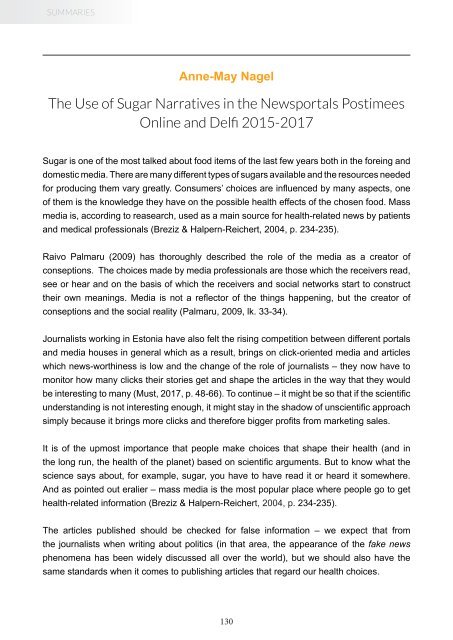TA_kogumik 2018-2019
Create successful ePaper yourself
Turn your PDF publications into a flip-book with our unique Google optimized e-Paper software.
SUMMARIES<br />
SUMMARIES<br />
Anne-May Nagel<br />
The Use of Sugar Narratives in the Newsportals Postimees<br />
Online and Delfi 2015-2017<br />
Sugar is one of the most talked about food items of the last few years both in the foreing and<br />
domestic media. There are many different types of sugars available and the resources needed<br />
for producing them vary greatly. Consumers’ choices are influenced by many aspects, one<br />
of them is the knowledge they have on the possible health effects of the chosen food. Mass<br />
media is, according to reasearch, used as a main source for health-related news by patients<br />
and medical professionals (Breziz & Halpern-Reichert, 2004, p. 234-235).<br />
Raivo Palmaru (2009) has thoroughly described the role of the media as a creator of<br />
conseptions. The choices made by media professionals are those which the receivers read,<br />
see or hear and on the basis of which the receivers and social networks start to construct<br />
their own meanings. Media is not a reflector of the things happening, but the creator of<br />
conseptions and the social reality (Palmaru, 2009, lk. 33-34).<br />
Journalists working in Estonia have also felt the rising competition between different portals<br />
and media houses in general which as a result, brings on click-oriented media and articles<br />
which news-worthiness is low and the change of the role of journalists – they now have to<br />
monitor how many clicks their stories get and shape the articles in the way that they would<br />
be interesting to many (Must, 2017, p. 48-66). To continue – it might be so that if the scientific<br />
understanding is not interesting enough, it might stay in the shadow of unscientific approach<br />
simply because it brings more clicks and therefore bigger profits from marketing sales.<br />
It is of the upmost importance that people make choices that shape their health (and in<br />
the long run, the health of the planet) based on scientific arguments. But to know what the<br />
science says about, for example, sugar, you have to have read it or heard it somewhere.<br />
And as pointed out eralier – mass media is the most popular place where people go to get<br />
health-related information (Breziz & Halpern-Reichert, 2004, p. 234-235).<br />
The articles published should be checked for false information – we expect that from<br />
the journalists when writing about politics (in that area, the appearance of the fake news<br />
phenomena has been widely discussed all over the world), but we should also have the<br />
same standards when it comes to publishing articles that regard our health choices.<br />
In my research, the topic of sugar was used as an example to find our which kind of narratives<br />
were used while talking about the realtions of sugar and health. The aim of the paper was to<br />
analyze which sugar narratives were used to describe sugar in the context of health in the<br />
online newsportals Postimees and Delfi. Three research questions were implemented:<br />
1. Which narratives were used in covering sugar in the context of health?<br />
2. Who were the groups most active in talking about sugar?<br />
3. If and how did the covering of sugar differ in the newsportals?<br />
Total of 145 articles from 2015 to 2017 were analyzed. The results revealed ten main<br />
narratives that occured in both of the portals.<br />
Narrative 1 – Sugar is an addictive substance comparable with<br />
Narrative 1.1 – Sugar addiction does not exist<br />
Narrative 2 – Miraculous side-effects of giving up<br />
Narrative 3 – Consumption of sugar is bad for you<br />
Narrative 4 – Excessive consumption of sugar is bad for you<br />
Narrative 5 – Excessive consumption of added sugars is bad for you<br />
Narrative 6 – White sugar is not the only dangerous sweetener<br />
Narrative 7 – Consumption of sugar has positive effects as<br />
Narrative 8 – One should not be afraid of sugar<br />
Narrative 9 – People consume too much sugar<br />
Narrative 10 – Sugar and sweets are consumed mainly for emotional reasons<br />
In addition, two narratives were found only in the online-portal Delfi.<br />
The narratives found were mostly about the negative effects of sugar – sugar addiction (25%<br />
of the articles mentioned it) and the different negative health outcomes of various types of<br />
sugar consumption were the most prevalent. The most quoted group was scientists.<br />
It must be considered that there is no such thing as a sugar addiction (Hebebrand et al.,<br />
2014) in the classification of diseases or as a medical diagnosis. Psychologists talk about<br />
food addiction in general or habits, it is not known that any type of a certain food could cause<br />
addiction (ibid). Therefore, the most prevalent narrative is characteristic of fake news in the<br />
health articles – there is no scientific basis to the claim. There was also a lot of confusion<br />
regarding the topic of which kind of sugar in what amounts is safe to consume (narratives<br />
3-5).<br />
130 131


